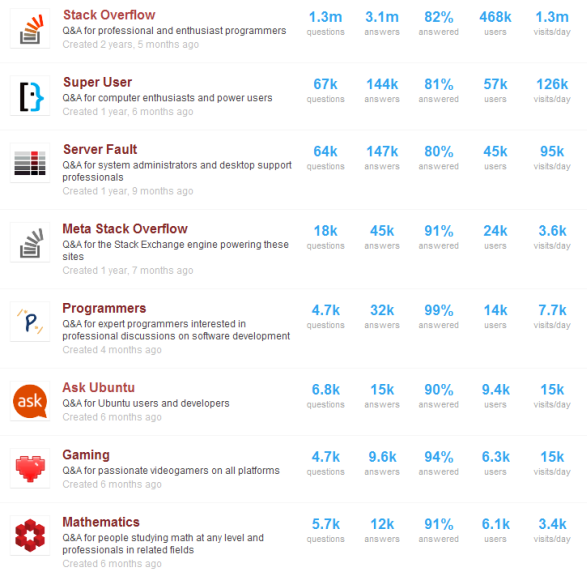Stack Overflow 2010: What’s Working, What’s Not
“Joel Spolsky is changing the world. Maybe not your world, but the world of programmers and software companies and the people who work for them.”
Opening lines of Seth Godin’s Tribes
When we last left our hero (whom BTW I finally met last week when the FogBugz / Kiln tour hit Tel Aviv), Stack Overflow had just brought in an all star team of VCs and we were wondering whether or not Stack Overflow could grow beyond the programmers community.
Joel Spolsky just published Stack Overflow’s 2010 year in review. The key takeaways:
- Stack Overflow grew to 16.6 million unique visitors per month. Their traffic is still about 90% SEO.
- Stack Exchange is up to 1.5 million uniques, and growing nicely.
- 80% of their questions have at least one answer that received at least one vote.
- They raised $6m earlier this year.
- Spolsky is still funny, insightful, and always worth reading.
Joel posts a nice graph showing Stack Exchange’s growth

He writes “If, as planned, we continue growing at 51% a month, we will be bigger than Facebook in 15 months.” Nice. He’s too modest to mention that not long after they’ll have more visitors than there are people on the planet!
But a slightly different view emerges when you look at their top sites (courtesy of http://stackexchange.com/sites)

Some points:
- All of their Stack Exchange sites other than Stack Overflow combine to less than one tenth of Stack Overflow’s traffic.
- The next four sites (not including the one about Stack Exchange itself) are all for computer power users.
- Then, in 7th place, at one tenth of Stack Overflow’s usage is the Computer Gaming site, which is hitting an overlapping demographic.
- Behind that, with 0.2% of Stack Exchange’s visits, is their Mathematics site (also a somewhat overlapping demographic), which they tout the way Demand Media touts LiveStrong.com, as though it’s evidence that something other than the primary model is working.
Here’s another way to look at the distribution:

- The vast majority of the traffic comes to Stack Overflow
- The vast majority of the remainder comes from the Stack Overflow’s 2 early sister sites, which seem to have been formed primarily to get those questions off of Stack Overflow, and which are targeted at a very similar demographic of computer professionals and power users
- The vast majority of the remainder is to other sites that are targeted at computer professionals and power users
- Then computer gamers
- Finally a tiny sliver, less than one percent of overall traffic, to sites about other subjects like math, cooking and English

One thing Joel left out of the year in review is any mention of revenue. Joel and Jeff did a good job of documenting their monetization failures but never let us know about any revenue successes. $6 million is a lot of money. But 27 employees, nice big New York office, plenty of other expenses. Would be nice to know their financial situation.
To sum up, StackOverflow had a great year in terms of traffic, content, and community. And they’ve grown beyond programming to other types of computer professionals and enthusiasts. Can they grow beyond that? I don’t know. Maybe they don’t have to.
February 27, 2011 @ 5:10 am
Gil, you should take a look at this page again http://stackexchange.com/sites and compare it to your current screenshot. You might find the numbers interesting 🙂
February 27, 2011 @ 8:51 pm
Hey Jeff, thanx for stopping by. Nice growth.
Google Kills eHow Competitors, eHow Rankings Up « Designs By Brian
February 27, 2011 @ 2:37 am
[…] first glance StackExchange’s growth looks exciting, but it has basically went nowhere outside of the programming niche. In my opinion they are going to need to find subject matter experts to lead some of their niche […]
Google Kills eHow Competitors, eHow Rankings Up
March 10, 2011 @ 12:19 pm
[…] first glance StackExchange’s growth looks exciting, but it has basically gone nowhere outside of the programming niche. In my opinion they are going to need to find subject matter experts to lead some of their niche […]
Google Kills eHow Competitors, eHow Rankings Up | Niffybranco.com
April 2, 2011 @ 6:06 pm
[…] first glance StackExchange's growth looks exciting, but it has basically gone nowhere outside of the programming niche. In my opinion they are going to need to find subject matter experts to lead some of their niche […]